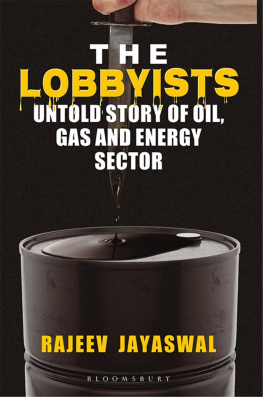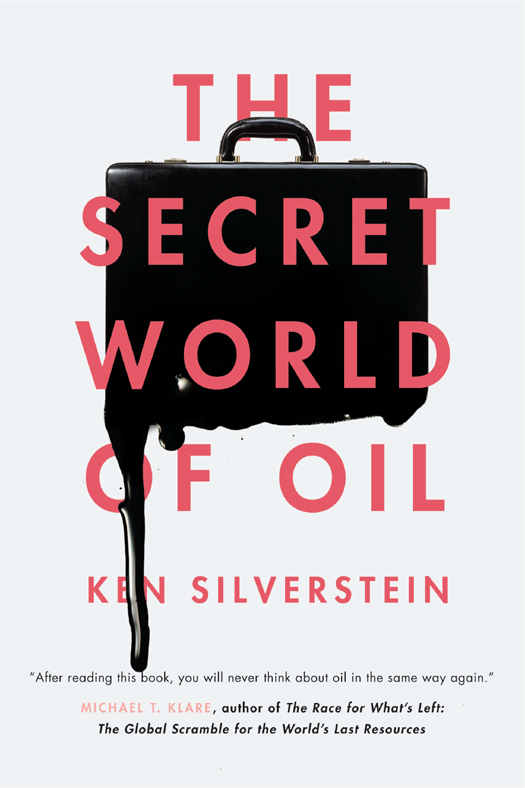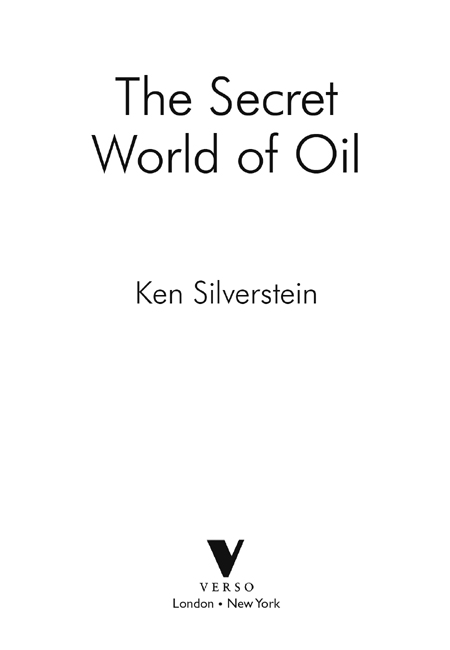First published by Verso 2014
Ken Silverstein 2014
All rights reserved
The moral rights of the author have been asserted
Verso
UK: 6 Meard Street, London W1F 0EG
US: 20 Jay Street, Suite 1010, Brooklyn, NY 11201
www.versobooks.com
Verso is the imprint of New Left Books
ISBN-13: 978-1-78168-137-4 (HBK)
ISBN-13: 978-1-78168-783-3 (EXPORT)
eISBN: 978-1-78168-193-0 (US)
eISBN: 978-1-78168-645-4 (UK)
British Library Cataloguing in Publication Data
A catalogue record for this book is available from the British Library
Library of Congress Cataloging-in-Publication Data
Silverstein, Ken.
The secret world of oil / Ken Silverstein.
pages cm
ISBN 978-1-78168-137-4 (hardback) ISBN 978-1-78168-193-0 (ebook) ISBN 978-1-78168-645-4 (ebook)
1. Petroleum industry and tradeEmployees.
2. Petroleum industry and tradeCorrupt practices. I. Title.
HD9560.5.S537 2014
338.27282dc23
2014000633
v3.1
To Gabriel and Sophia, again.
The author would like to thank Open Society Foundations, where he was a fellow, for supporting the research that led to this book, and thanks also to Open Societys Justice Initiative. Thanks go as well to Harpers, Foreign Policy, Slate, the New Republic, and Salon, where parts of this book were previously published.
Contents
Introduction
The Secret World of Oil
Most people think about oil as something pumped from the ground or used to make the gasoline that fills their fuel tanks. But between those two points, and beyond, a wide range of players takes a cut of the profits, from middlemen who broker deals between energy companies and government officials in countries sitting atop the worlds energy reserves, to academics, lobbyists, and flacks whose incomes derive from their promotion of the fossil fuel economy.
This book will explore the secret world of oil and examine the little discussed but important role played by these various actors in the global fossil fuel economy. These fixers, traders, and lobbyists dont generally own nor operate oil refineries or wells; nevertheless, they smooth the workings of the energy business on the basis of discreet payments and backroom deals. They typically have excellent political contacts, which they can, when necessary, leverage into legal protection. Indeed, their success depends on their intimate connections to senior-level decision makers. You have to deal with governments and ministers, and you have to service those people, one Swiss oilman told me. You can call it corruption, but its part of the system.
Thats important to keep in mind, especially at a time when the global energy picture has been unusually bright. For much of 2013, for example, the US media was filled with upbeat news about Americas energy situation. Thanks to new technology and higher prices, the energy industry was extracting millions of barrels more a week, from the deepest waters of the Gulf of Mexico to the prairies of North Dakota, the New York Times said in a story early in the year. As a result the United States was moving closer to becoming independent from foreign energy sources of both oil and natural gas, a milestone that could reconfigure American foreign policy, the economy and more.
Output was growing so quickly that the Energy Department reported that the US might overtake Saudi Arabia and become the worlds largest producer by 2020, leading Congress to consider lifting a ban on exporting crude oil that was put in place after the Arab embargo of the 1970s. Meanwhile, Americans were driving less and buying more fuel-efficient cars, and hence using far less gasoline. For decades, consumption rose, production fell and imports increased, and now every one of those trends is going the other way, Michael Levi, an energy and environmental senior fellow at the Council on Foreign Relations, told the Times.
This was deemed to be especially good news, because despite concerns about global warming, oil and other fossil fuels will remain the dominant source for the global economy for a very long time. Petroleum and natural gas will provide about half of Americas total energy supply in 2030, according to the Energy Department, not significantly less than they do now. Furthermore, the US transportation network, and hence the broader economy, is overwhelmingly fueled by petroleum derivatives such as gasoline, diesel, and jet fuel.
And as a Financial Times article put it in September 2013, even as the US was drowning in oil, the world has become, if anything, more dependent on a handful of Gulf producers to fill supply shortfallsoil production in Saudi Arabia, Kuwait, and the United Arab Emirates was at record levels. The article concluded:
For all the talk about the shale boom, then, it is business as usual for the rest of the world in terms of supply. The concern remains, despite apparent nonchalance, that consuming nations like the US, China, and India will be stifled should production disruptions last.
In other words, oil and natural resource policy are as vital to global affairs as ever. Because of its financial weight and political significance, energy is the worlds most important commodity and represents a $6 trillion annual market. Daniel Yergin estimates in his book The Quest that the value of the energy economy could increase by as much as 40 percent over the next twenty years, because of soaring demand, mostly from China, India, and other rising economic powers. And even with the surge in domestic production, the US (and its Western partners) will be importing oil and gas for decades to come, much of it coming from Third World countries with terrible records on human rights and corruption, among them Saudi Arabia, Nigeria, Iraq, Angola, Kuwait, Colombia, Azerbaijan, and Equatorial Guinea. As Dick Cheney once said, The good Lord didnt see fit to put oil and gas only where there are democratic regimes friendly to the United States.
Whether the Unites States is exporting it or importing it, with oil some things never change. The political power of the energy industry, for example, remains as formidable as ever. Individuals and political action committees affiliated with oil and gas companies have collectively donated $238.7 million to candidates and the two parties (75 percent went to Republicans) over the past thirteen years, according to data from the Center for Responsive Politics. Between 2008 and 2012, they spent an average of about $150 million per year on Washington lobbying. Midway through the last year, oil and gas companies had spent more on lobbying than all but four other industries (the pharmaceutical sector was number one) and almost as much as Wall Street and defense combined.
The industry won huge favors during the administration of former oilmen George W. Bush and Dick Cheney but has fared quite well under Barack Obama as well. A piece that ran in 2013 on the Forbes magazine Web site, Dont Worry Big Oil, President Obama Probably Doesnt Hate You As Much As You Think, noted that his administration had done much to help energy companies and had largely dismissed calls by environmentalists and others to regulate the industry.
Another constant in the energy business is corruption. Partly due to the political geography Cheney referred to, the energy industry violates the US Foreign Corrupt Practices Act more frequently than any other economic sector, even weapons makers. Two central figures in this secret world are fixers and traders. Fixers open doors for corporate clients and arrange introductions to the various potentates they know. They help companies navigate the local bureaucracy, or provide the lay of the land with political and economic intelligence, or point to important people or companies that should be courted or hired in order to curry favor. Fixers funnel money to dictators to obtain concessions for oil companies, set up shell firms and front companies to move money, and line up firms to explore for oil. In some cases, fixers feed money to those in power, in payoffs that often would be illegal under American and European antibribery laws.









